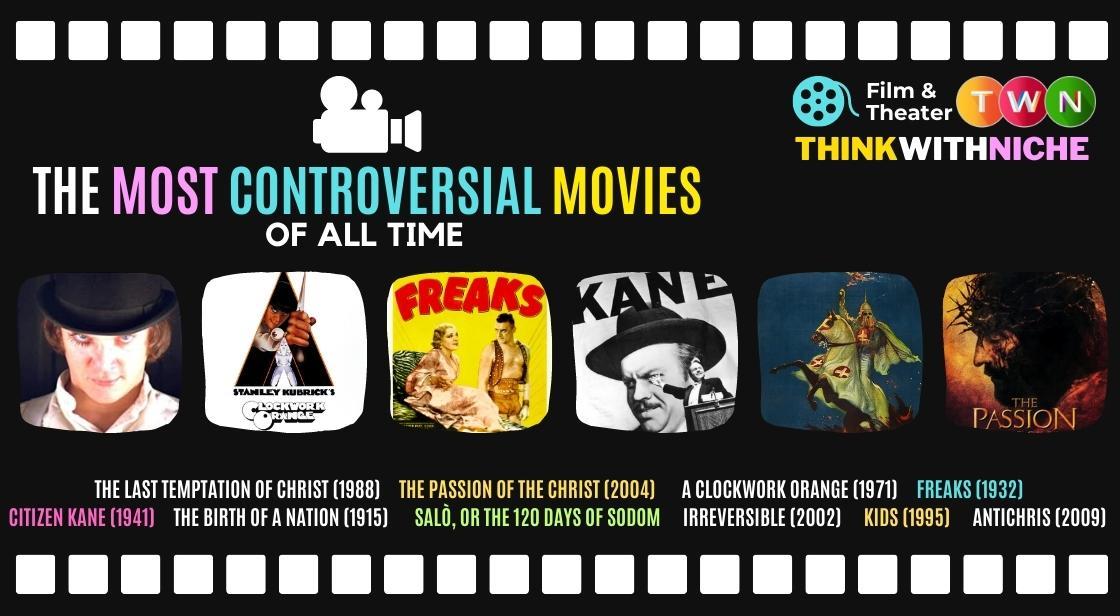Explore The Most Controversial Movies Ever Made

Blog Post
Imagine being captivated by a film so daring, so contentious that it sets the world abuzz in heated debate. What is it about these controversial cinematic creations that make them so captivating, so irresistible?
Let's embark on a journey into the heart of cinema's most audacious and provocative masterpieces.
Delve into the world of cinema's most contentious and thought-provoking creations with a journey through the most controversial movies ever made. Uncover the films that ignited debates, challenged societal norms, and left lasting impressions on audiences worldwide.
From boundary-pushing masterpieces to polarizing works of art, these movies have shaped cultural discussions and continue to captivate viewers with their bold storytelling and provocative themes.
"Controversial films don't just tell a story, they challenge, they provoke, they force us to question societal norms."
These are the films that have sparked intense conversations, broken barriers, and left enduring impressions on generations of viewers. They didn't just push boundaries, they obliterated them, leaving behind a legacy of bold storytelling and thought-provoking themes.
From the polarizing works of art to the radical narratives, these films have been instrumental in shaping cultural and societal conversations around the globe. They've made us squirm, reflect, argue, and more importantly, they've made us think.
Underneath the glistening glamour of Hollywood's red-carpet premieres and blockbuster hits, lies a stirring domain of cinema that has persistently sparked controversy.
These are the films that dared to challenge the status quo, opened conversations on taboo subjects, and pushed the boundaries of artistic expression. These masterpieces, often divisive yet undeniably captivating, continue to engage audiences today.
Ready for the ride? Buckle up, as we delve deeper into the world of cinema's most controversial yet fascinating creations.
Cinema has the power to evoke a wide range of emotions and thoughts, and some films go beyond entertainment to challenge societal norms, beliefs, and values.
These controversial movies have stirred intense discussions and debates, captivating viewers with their audacious storytelling and daring concepts.
In this article, we will explore twelve of the most controversial films ever made, highlighting their impact on the film industry and their enduring legacy.
"These films serve as a mirror, reflecting societal attitudes and norms, often in ways that are uncomfortable but undeniably compelling."
Exploring the Most Controversial Movies Ever Made
Strap in, reader, because we are about to embark on a cinematic journey through the annals of controversial film history. These are not just your ordinary flicks, these are the game-changers, the boundary pushers, the ones that unfailingly sparked heated debates around dinner tables and social media platforms alike. Ready to dive in?
1. The Last Temptation of Christ (1988)
Directed by: Martin Scorsese
Concept: Based on the novel by Nikos Kazantzakis, the film explores the inner struggle and doubts faced by Jesus Christ as he grapples with his divine mission and human desires.
Release Date: August 12, 1988
Main Cast: Willem Dafoe, Harvey Keitel, Barbara Hershey.
Martin Scorsese's The Last Temptation of Christ: A Provocative and Thought-Provoking Exploration of Jesus' Humanity
This title captures the essence of the film, which is a controversial exploration of Jesus' humanity. The film is based on the novel by Nikos Kazantzakis, which tells the story of Jesus Christ from a unique perspective.
The film was met with protests from religious groups, but it has also been praised for its thought-provoking exploration of Jesus' inner struggles.
It was directed by Martin Scorsese, who is known for his gritty and realistic films. The Last Temptation of Christ is a unique and challenging film that is sure to spark discussion and debate.
Facts about the film:
-
The film was banned in several countries, including Italy, Spain, and Ireland.
-
The film was picketed by religious groups in the United States.
-
The film was nominated for two Golden Globe Awards, including Best Foreign Language Film.
-
The film was praised by critics for its visual style and its exploration of complex themes.
-
The film was a box office disappointment, grossing only $11 million worldwide.
Despite its controversy, The Last Temptation of Christ is a powerful and thought-provoking film that is sure to stay with you long after you've seen it.
2. The Birth of a Nation (1915)
Directed by: D. W. Griffith
Concept: A highly co ntroversial film that portrays racial stereotypes and glorifies the Ku Klux Klan, sparking widespread criticism and debates on racism in cinema.
Release Date: February 8, 1915
Main Cast: Lillian Gish, Henry B. Walthall, Mae Marsh.
D.W. Griffith's The Birth of a Nation: A Landmark Film That Sparked a National Debate on Racism
This title captures the essence of the film, which is a landmark film that is also one of the most controversial films ever made. The film was praised for its technical innovations, but it was also criticized for its racist portrayal of black people. The film was a box office success, but it also sparked a national debate on racism.
The film tells the story of the Civil War and Reconstruction era from the perspective of the Ku Klux Klan. The film portrays black people as lazy, unintelligent, and violent, and it glorifies the Klan as a force for good in the South. The film was met with protests from civil rights groups, and it was banned in several cities.
Despite the controversy, The Birth of a Nation is a landmark film that had a profound impact on American cinema. The film's technical innovations, such as its use of close-ups and cross-cutting, were groundbreaking. The film also popularized the use of the Ku Klux Klan as a symbol of white supremacy.
The Birth of a Nation is a complex and controversial film that is still relevant today. The film's portrayal of black people is racist and harmful, but the film's technical innovations and its impact on American cinema are undeniable.
Facts about the film:
-
The film was nominated for an Academy Award for Best Picture.
-
The film was selected for preservation in the U.S. National Film Registry by the Library of Congress in 1992.
-
The film was remade in 1930.
-
The film has been the subject of many scholarly studies.
-
The film has been cited as an inspiration for white supremacist groups.
3. The Passion of the Christ (2004)
Directed by: Mel Gibson
Concept: This religious drama depicts the last twelve hours of Jesus Christ's life, focusing on his crucifixion and death, which sparked discussions on violence and historical accuracy.
Release Date: February 25, 2004
Main Cast: Jim Caviezel, Monica Bellucci, Maia Morgenstern.
Mel Gibson's The Passion of the Christ: A Graphic and Gritty Portrayal of Jesus' Final Hours
These titles capture the essence of the film, which is a graphic and gritty portrayal of Jesus' final hours. The film was directed by Mel Gibson, who is known for his controversial films.
The film tells the story of Jesus Christ's final twelve hours before his crucifixion, from his betrayal by Judas Iscariot to his death on the cross. The film's depiction of violence and suffering was seen as too extreme by some, and it was criticized for its historical inaccuracies.
Despite its controversy, The Passion of the Christ was a commercial success, grossing over $600 million worldwide. The film was also nominated for three Academy Awards, including Best Cinematography and Best Makeup.
Facts about the film:
- The film was directed by Mel Gibson, who also starred in the film.
- The film was shot in Italy in 2003, and it was released in the United States in 2004.
- The film was translated into 35 languages and was shown in over 1,500 theaters worldwide.
- The film was the highest-grossing religious film of all time until it was surpassed by The Lion King in 2019.
- The film was criticized for its graphic depiction of violence and its historical inaccuracies.
4. A Clockwork Orange (1971)
Directed by: Stanley Kubrick
Concept: Set in a dystopian future, the film explores themes of violence, free will, and government control, generating controversy due to its explicit content and portrayal of societal decay.
Release Date: December 19, 1971
Main Cast: Malcolm McDowell, Patrick Magee, Michael Bates.
Stanley Kubrick's A Clockwork Orange: A Controversial Dystopian Satire That Explores the Dangers of Government Control and the Nature of Free Will
This title captures the essence of the film, which is a controversial dystopian satire that explores the dangers of government control and the nature of free will. The film is set in a dystopian future where the government uses psychological conditioning to reform criminals. The film stars Malcolm McDowell as Alex DeLarge, a young man who is sentenced to the government program.
The film was praised for its visual style and its exploration of complex themes, but it was also criticized for its violence and its sexual content. The film was banned in several countries, including the United Kingdom.
"The movie A Clockwork Orange was banned in the UK for 27 years."
Despite its controversy, A Clockwork Orange is a powerful and thought-provoking film that is sure to stay with you long after you've seen it.
Facts about the film:
-
The film was nominated for four Academy Awards, including Best Picture.
-
The film was selected for preservation in the U.S. National Film Registry by the Library of Congress in 1999.
-
The film was remade in 2007.
-
The film has been the subject of many scholarly studies.
-
The film has been cited as an inspiration for other dystopian works, such as The Hunger Games and Brazil.
5. Freaks (1932)
Directed by: Tod Browning
Concept: A cult classic that features a cast of real circus performers and sideshow artists, challenging societal perceptions of physical abnormalities and generating controversy for its depiction of "freaks."
Release Date: February 20, 1932
Main Cast: Wallace Ford, Leila Hyams, Olga Baclanova.
Tod Browning's Freaks: A Controversial Cult Classic That Challenges Societal Perceptions of Physical Abnormalities
This title captures the essence of the film, which is a controversial cult classic that challenges societal perceptions of physical abnormalities. The film features a cast of real circus performers and sideshow artists, and it was met with protests from both audiences and critics when it was first released.
The film tells the story of a trapeze artist who marries a wealthy man but is then rejected by his family and friends when they discover that she is part of the circus. The film's depiction of "freaks" was seen as exploitative and offensive by many, and the film was banned in several countries.
Despite its controversy, Freaks has since become a cult classic, and it is now seen as a groundbreaking film that challenged the status quo. The film's cast of real circus performers brought a unique authenticity to the film, and its exploration of themes of prejudice and acceptance is still relevant today.
Facts about the film:
-
The film was directed by Tod Browning, who also directed Dracula (1931).
-
The film was nominated for two Academy Awards, including Best Writing (Original Screenplay).
-
The film was selected for preservation in the U.S. National Film Registry by the Library of Congress in 1994.
-
The film has been the subject of many scholarly studies.
-
The film has been cited as an inspiration for other films, such as The Elephant Man (1980) and Mulholland Drive (2001).
Also Read: Top Directors Of World Cinema
6. Citizen Kane (1941)
Directed by: Orson Welles
Concept: Though considered one of the greatest films of all time, Citizen Kane faced controversy for its resemblance to the life of newspaper magnate William Randolph Hearst, leading to efforts to suppress its release.
Release Date: September 5, 1941
Main Cast: Orson Welles, Joseph Cotten, Dorothy Comingore.
Orson Welles' Citizen Kane: A Controversial Masterpiece That Explores the Ambiguity of Success and the American Dream
This title captures the essence of the film, which is a controversial masterpiece that explores the ambiguity of success and the American dream. The film is widely considered to be one of the greatest films ever made, but it was also met with controversy when it was first released.
The film tells the story of Charles Foster Kane, a wealthy newspaper magnate who is ultimately a failure. The film's depiction of Kane was seen as a thinly veiled attack on William Randolph Hearst, a powerful newspaper magnate who was known for his ego and his ruthlessness.
Hearst was so incensed by the film that he tried to suppress its release. He threatened to pull his advertising from any theater that showed the film, and he even tried to buy the film outright. However, Welles and his team were able to get the film released, and it went on to become a critical and commercial success.
Citizen Kane is a complex and challenging film that is still relevant today. The film's exploration of the American dream is as relevant now as it was when the film was first released. The film is a must-see for any fan of cinema.
7. Salò, or the 120 Days of Sodom
Directed by: Pier Paolo Pasolini
Concept: A shocking and explicit film based on Marquis de Sade's writings, exploring themes of power, sadism, and political corruption, pushing the boundaries of censorship and societal acceptance.
Release Date: November 22, 1975
Main Cast: Paolo Bonacelli, Giorgio Cataldi, Umberto Paolo Quintavalle.
Pier Paolo Pasolini's Salò, or the 120 Days of Sodom: A Shocking and Explicit Film That Explores the Power of Sadism, Political Corruption, and the Limits of Censorship
This title captures the essence of the film, which is a shocking and explicit film that explores the power of sadism, political corruption, and the limits of censorship. The film is based on the novel by Marquis de Sade, and it tells the story of four wealthy men who kidnap nine young people and subject them to 120 days of torture and depravity.
The film was met with widespread controversy when it was first released, and it was banned in several countries. The film's graphic depiction of sex and violence was seen as too extreme for many, and it was accused of being pornographic.
Despite its controversy, Salò, or the 120 Days of Sodom has since become a cult classic, and it is now seen as a groundbreaking film that explores the darkest recesses of the human psyche. The film's director, Pier Paolo Pasolini, was a controversial figure in his own right, and his death shortly after the film's release only added to its mystique.
Facts about the film:
-
The film was directed by Pier Paolo Pasolini, who was also a poet, writer, and filmmaker.
-
The film was based on the novel by Marquis de Sade, which was originally published in 1785.
-
The film was shot in Italy in 1975, and it was released in France in 1976.
-
The film was banned in several countries, including Italy, the United Kingdom, and the United States.
-
The film was restored in 2000 and released in a new version.
8. Irreversible (2002)
Directed by: Gaspar Noé
Concept: Known for its highly graphic and controversial scenes, the film uses a reverse chronological order to explore themes of violence, revenge, and the irreversible consequences of actions.
Release Date: May 22, 2002
Main Cast: Monica Bellucci, Vincent Cassel, Albert Dupontel.
Gaspar Noé's Irreversible: A Brutal and Controversial Film That Explores the Irreversible Consequences of Violence and Revenge
This title captures the essence of the film, which is a brutal and controversial film that explores the irreversible consequences of violence and revenge. The film is told in reverse chronological order, starting with the most graphic scene and working its way back to the beginning.
The film tells the story of Marcus (Vincent Cassel), a man who goes on a violent rampage in search of the men who raped and murdered his girlfriend, Alex (Monica Bellucci). The film's graphic depiction of violence and rape was seen as too extreme by many, and it was banned in several countries.
Despite its controversy, Irreversible has since become a cult classic, and it is now seen as a groundbreaking film that explores the dark side of human nature. The film's director, Gaspar Noé, is known for his controversial films, and Irreversible is his most extreme film to date.
Facts about the film:
-
The film was directed by Gaspar Noé, who is also the director of Enter the Void and Climax.
-
The film was shot in Paris in 2001, and it was released in France in 2002.
-
The film was banned in several countries, including the United Kingdom and Australia.
-
The film was nominated for the Palme d'Or at the 2002 Cannes Film Festival.
-
The film was released in a director's cut in 2012.
9. Kids (1995)
Directed by: Larry Clark
Concept: A raw and unflinching portrayal of urban youth culture, the film faced controversy for its explicit depiction of drug use, sexuality, and risky behavior among teenagers.
Release Date: July 28, 1995
Main Cast: Leo Fitzpatrick, Justin Pierce, Chloë Sevigny.
Larry Clark's Kids: A Raw and Unflinching Portrait of Urban Youth Culture That Explores the Dangers of Drug Use, Sexuality, and Risky Behavior among Teenagers
This title captures the essence of the film, which is a raw and unflinching portrait of urban youth culture that explores the dangers of drug use, sexuality, and risky behavior among teenagers. The film was directed by Larry Clark, who is known for his controversial films that depict the dark side of American life.
The film tells the story of a group of teenagers in New York City who are struggling with drug addiction, unplanned pregnancies, and HIV/AIDS. The film's graphic depiction of these issues was seen as too extreme by many, and it was banned in several countries.
Despite its controversy, Kids has since become a cult classic, and it is now seen as a groundbreaking film that captures the reality of urban youth culture. The film's director, Larry Clark, is a controversial figure in his own right, and his work has been praised for its honesty and its rawness.
Facts about the film:
-
The film was directed by Larry Clark, who was also the director of Gummo and Ken Park.
-
The film was shot in New York City in 1995, and it was released in the United States in 1996.
-
The film was banned in several countries, including Canada and Australia.
-
The film was nominated for the Palme d'Or at the 1995 Cannes Film Festival.
-
The film was released on DVD in 2005, and it was re-released in a remastered version in 2019.
10. Antichrist (2009)
Directed by: Lars von Trier
Concept: An unsettling and controversial horror film that explores grief, sexuality, and violence, provoking mixed reactions and discussions on the film's themes and imagery.
Release Date: May 18, 2009
Main Cast: Willem Dafoe, Charlotte Gainsbourg.
Lars von Trier's Antichrist: An Unsettling and Controversial Horror Film That Explores the Themes of Grief, Sexuality, and Violence
This title captures the essence of the film, which is an unsettling and controversial horror film that explores the themes of grief, sexuality, and violence. The film was directed by Lars von Trier, who is known for his provocative and challenging films.
The film tells the story of a couple who retreat to a cabin in the woods after the death of their son. The woman, who is played by Charlotte Gainsbourg, begins to experience strange and disturbing visions, and she eventually descends into madness. The film's graphic depiction of violence and sexuality was seen as too extreme by many, and it was banned in several countries.
Despite its controversy, Antichrist has since become a cult classic, and it is now seen as a groundbreaking film that explores the darker side of human nature. The film's director, Lars von Trier, is a controversial figure in his own right, and his work has been praised for its honesty and its rawness.
Facts about the film:
-
The film was directed by Lars von Trier, who is also the director of Dogville, Melancholia, and Dancer in the Dark.
-
The film was shot in Sweden in 2008, and it was released in Denmark in 2009.
-
The film was banned in several countries, including Norway and Iceland.
-
The film was nominated for the Palme d'Or at the 2009 Cannes Film Festival.
-
The film was released on DVD in 2010, and it was re-released in a remastered version in 2019.
Uncovering the Legacy of Controversial Films: How they Continue to Influence Filmmaking Today
When we talk about controversial films, we are peeling back the layers of cinema that boldly dared to challenge the status quo. These films, often subject to public outcry and censorship, have nonetheless carved out a significant place in the annals of film history.
These films weren’t merely created for shock value, but to spark dialogues, to question societal norms, and to push the boundaries of storytelling. Their legacy is evident in the way they have influenced filmmakers, encouraging them to be daring, to take risks and to explore uncomfortable truths.
Conclusion
These controversial films have left an indelible mark on cinema history, challenging norms, sparking debates, and provoking discussions on a wide range of societal and artistic issues.
Despite the controversies they faced, these movies continue to be regarded as bold and influential works of art that have shaped the landscape of cinema for generations to come.
Disclaimer:The blog post titled "Explore the Most Controversial Movies Ever Made" is intended for informational and entertainment purposes only. The blog may discuss movies that have faced controversies, provocative themes, and societal debates. However, the inclusion of these movies in the blog does not endorse or promote any explicit content or offensive materials.
You May Like
EDITOR’S CHOICE












